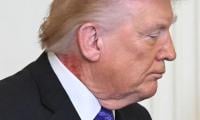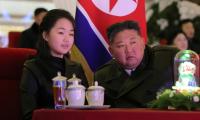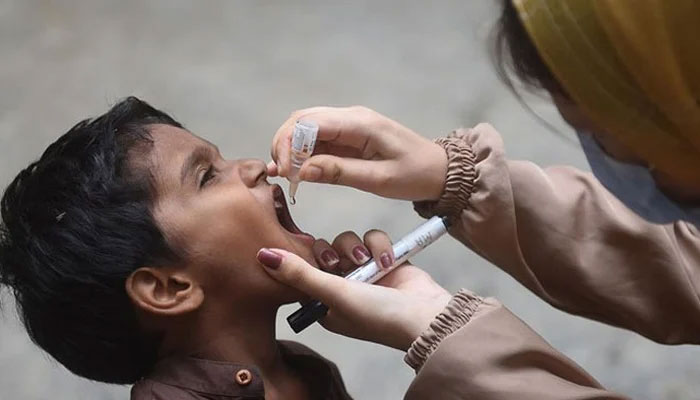Severe paralysis found in 60pc zero-dose polio affected children
ISLAMABAD: With over 60 percent of 59 children affected by polio in Pakistan this year having received no routine immunisation, health authorities have set up a committee to strengthen synergy between Polio Eradication Initiative (PEI) and Expanded Programme on Immunisation (EPI).
The decision aligns with recommendations from Polio Oversight Board (POB), which recently reviewed Pakistan’s efforts to eradicate the virus, officials told The News on Tuesday.Officials said issue of zero-dose children remains critical, with 33 of 59 affected children having received not a single dose of routine vaccination. Severe paralysis has been observed in these cases, indicating low immunity and highlighting urgency of strengthening routine immunisation systems.
The steering committee, constituted by Ministry of National Health Services, Regulations and Coordination (NHSR&C), has been tasked with addressing key challenges hampering polio eradication and routine immunisation coverage, particularly in high-risk areas. It aims to enhance coordination, provide strategic guidance and monitor implementation plans for achieving immunisation goals across the country.
Comprising senior government officials and representatives from international health organisations, committee is chaired by Prime Minister’s Coordinator for Health Services Dr Malik Muhtar Ahmed Barath.
Its members include Secretary of NHSR&C, Director General of Health, National Coordinator of National Emergency Operation Centre (NEOC) and representatives from WHO, Unicef, CDC and Bill & Melinda Gates Foundation. Provincial health directors from Punjab, Sindh, Khyber Pakhtunkhwa and Balochistan also form part of this high-level body.
The committee’s objectives include strengthening coordination between PEI and EPI, aligning partner activities, resolving critical issues affecting programme performance and engaging stakeholders to bolster support for both initiatives.
National Coordinator for EOC, Capt (retd) Anwar-ul-Haq, announced at a media briefing a nationwide polio vaccination campaign will be conducted from December 16 to 22. The campaign will target 44 million children in 143 districts across Pakistan, excluding certain districts in Gilgit-Baltistan and Azad Jammu and Kashmir due to logistical constraints.
Anwar-ul-Haq, alongside Prime Minister’s Focal Person on Polio Eradication, Ayesha Raza Farooq, and technical experts, including Dr Rana Muhammad Safdar from US CDC and Altaf Bosan from BMGF emphasised importance of public cooperation to ensure every child is vaccinated.
Pakistan’s fight against polio continues to face hurdles. Despite reducing wild polio cases by 99pc since the launch of Pakistan Polio Eradication Initiative in 1994, reintroduction of YB3A genetic cluster of wild poliovirus type 1 (WPV1) in 2023 through cross-border transmission has spread the virus to 82 districts. Absence of routine immunisation among a large cohort of children has created immunity gaps, making these populations vulnerable to virus.
Insecurity in regions like southern KP and Balochistan poses a substantial challenge, with disruptions in vaccination campaigns, leaving many children inaccessible or under-immunised. Additionally, demands-based refusals in these regions, where communities boycott polio campaigns as leverage for other services, further complicate eradication efforts.
Misconceptions and propaganda against polio vaccines also hinder progress, as some parents refuse to vaccinate their children despite the vaccine’s proven safety and efficacy. Since its inception, Pakistan’s Polio Eradication Initiative has achieved remarkable milestones. Wild polio cases have dropped from an estimated 20,000 annually in 1990s to 59 cases so far in 2024.
The number of wild poliovirus genetic clusters has also been significantly reduced — from 11 in 2020 to just one. The YB3A is currently in circulation. The YB3C genetic cluster, which was indigenous to Pakistan, has not been detected since November 2023, indicating its potential eradication.
Anwar-ul-Haq highlighted Pakistan’s poliovirus surveillance system, which is among the largest and most sensitive globally. The network includes over 12,000 acute flaccid paralysis (AFP) reporting sites and 127 environmental sampling sites in 87 districts. This year alone, some 20,000 AFP samples and over 1,800 environmental samples have been tested, with 29pc of environmental samples testing positive for WPV1.
Ayesha Raza stressed the need to counter vaccine-related misconceptions through accurate information. She asked media to help dispel myths and build trust in vaccination programmes, which are vital to saving lives and eradicating polio. She emphasised the oral polio vaccine has been instrumental in eliminating polio in most countries, including Muslim-majority nations. She urged parents to ensure their children’s vaccination.
-
 From Aspirin To Cream: White House Links President Trump’s Neck Rash To ‘preventative’ Skin Treatment
From Aspirin To Cream: White House Links President Trump’s Neck Rash To ‘preventative’ Skin Treatment -
 ChatGPT Or ‘QuitGPT’? OpenAI’s App Uninstall Rate Jumps 295 Percent After Pentagon Deal
ChatGPT Or ‘QuitGPT’? OpenAI’s App Uninstall Rate Jumps 295 Percent After Pentagon Deal -
 Angelina Jolie, Louis Garrel's Relationship Status Finally Revealed
Angelina Jolie, Louis Garrel's Relationship Status Finally Revealed -
 Royal Family Vs Taxpayers: Andrew’s Donation To Virginia Giuffre’s Charity As MP Questions
Royal Family Vs Taxpayers: Andrew’s Donation To Virginia Giuffre’s Charity As MP Questions -
 OpenAI’s Sam Altman Calls Pentagon Deal ‘opportunistic And Sloppy’ Amid Backlash; Seeks Further Amendments
OpenAI’s Sam Altman Calls Pentagon Deal ‘opportunistic And Sloppy’ Amid Backlash; Seeks Further Amendments -
 Claude Still Down? Latest Updates On Outage
Claude Still Down? Latest Updates On Outage -
 Watch: Nancy Guthrie's Suspect Break His Silence After Being Dubbed Masked Kidnapper
Watch: Nancy Guthrie's Suspect Break His Silence After Being Dubbed Masked Kidnapper -
 British Columbia Daylight Saving Ends As Province Adopts Permanent Time
British Columbia Daylight Saving Ends As Province Adopts Permanent Time -
 'Deadliest Catch' Star Dies In Tragic Incident At 25
'Deadliest Catch' Star Dies In Tragic Incident At 25 -
 Kawhi Leonard Earns All-NBA Praise From Zach Lowe After Clippers Turnaround
Kawhi Leonard Earns All-NBA Praise From Zach Lowe After Clippers Turnaround -
 Nuggets Vs Jazz: Jamal Murray’s 45 Points Power Denver Past Utah
Nuggets Vs Jazz: Jamal Murray’s 45 Points Power Denver Past Utah -
 Justin Timberlake Moves To Block Release Of Body Cam Footage From DWI Arrest
Justin Timberlake Moves To Block Release Of Body Cam Footage From DWI Arrest -
 Kim Jong Un’s Future Under Speculation: Could His Daughter Lead North Korea?
Kim Jong Un’s Future Under Speculation: Could His Daughter Lead North Korea? -
 Nancy Mace Under Investigation By House Ethics Panel For Alleged Overcharges
Nancy Mace Under Investigation By House Ethics Panel For Alleged Overcharges -
 'Sinners' Star Jayme Lawson Calls Out BAFTA Organisers For Exploiting Tourette's Advocate
'Sinners' Star Jayme Lawson Calls Out BAFTA Organisers For Exploiting Tourette's Advocate -
 Lauren Boebert Gets Yelled At By Hillary Clinton Over Leaked Photo During Epstein Deposition
Lauren Boebert Gets Yelled At By Hillary Clinton Over Leaked Photo During Epstein Deposition




